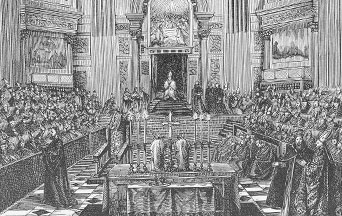
Council Fathers learned the names of the twenty-four members of the Postulata Commission, appointed by Pius IX; elected the five members of the Judices Querelarum commission; and heard the reading of a new Apostolic Constitution, which regulated the election of the Supreme Pontiff if the pope should die during the works. This document not only laid down rules for the Vatican Council but definitively regulated the pope’s succession when the Holy See became vacant during a Council. The Council would be immediately suspended, and the cardinals would elect the new pontiff. Council meetings or deliberations after the pope’s death were expressly forbidden.
Eternal and Natural Law: The Foundation of Morals and Law
True to form, the Liberal Catholic faction always searched for pretexts to allege a lack of freedom at the Council. Accordingly, they complained that this Apostolic Constitution was a sign that Pius IX was ready to implement a dictatorship. Clinging to their old prejudices about a Church council having superiority over the pope, they would not admit that the Holy Father should legislate for future Councils when the universal episcopate is gathered together. The assembled bishops, they contended, should establish the definitive laws of the Church.
Another cause of unrest in the minority after the first General Congregation was the election of the members of the four commissions that had not yet been established. The de Fide Commission stood out because it would prepare the schemes to be presented to the plenary sessions. These included burning issues the liberals wanted to avoid.
Bishop Dupanloup assembled a list of candidates naturally made up of his allies. These consisted of two groups: Opportunists argued that the Council would be an inopportune time to define papal infallibility, and Infallibilists opposed papal infallibility altogether. There was considerable overlap between the two groups, as many opportunists were actually infallibilists, wanting to avoid taking a definite position.
In turn, the majority—those who favored the new definition—met at Cardinal Deschamps’ house and also formed a slate. At first, some infallibilist Fathers favored a list of candidates that included minority members. Cardinal Manning strenuously opposed that move, positing that “heretics come to a council to be heard and condemned, not to participate in the formulation of doctrine.” Having convinced the infallibilist Fathers, Cardinal Manning put together the majority’s list, entirely excluding anti-infallibilists and opportunists.
The second General Congregation met on December 14. As if responding to criticism from liberal Catholics, Pius IX informed the Council of the Bull Apostolicae Sedis, which profoundly modified and censured legislation. With this act, the pope reaffirmed his right to draw up definitive Church legislation independently of a Council. Indeed, he had not even consulted the bishops present in Rome about his planned reform. All of Cardinal Manning’s candidates for the de Fide Commission were elected. The Council Fathers also established a Commission of Discipline and elected its members.
 Learn All About the Prophecies of Our Lady of Good Success About Our Times
Learn All About the Prophecies of Our Lady of Good Success About Our Times
The other General Congregations held in December reached no results. The Council Fathers had not yet become familiar with the rules of order. They only succeeded in electing members of the de Rebus Ordinum Regularium (Regulations for Regular Orders) and de Rebus Ritus Orientalis (Regulations for the Eastern Rite) commissions, the last remaining for the definitive organization of the Council.
The second public session was held on January 6, 1870. Standing as the entire assembly bowed, the Holy Father Pius IX opened the Council’s meetings by reciting the Adoremus prayer:
O Lord Holy Ghost, behold us gathered together in thy Name, albeit with the shackles of sin. Come to us, be with us, and deign to permeate our hearts. Teach us the ways to follow and the works to accomplish so that, with Thy help, we may please Thee in all things. O Thou who possess a glorious Name with God the Father and His Son, be the supreme inspirer and author of our judgments. Allow us not, Thou Who lovest sovereign equity, to be disturbers of justice, nor let ignorance incapacitate us, weaken our fervor or corrupt our views of people and present events. Unite us to Thee by the exclusive gift of Thy grace so that we may be one in Thee and nothing may deviate us from the truth. Instead, gathered in Thy Name, we may punctiliously keep mercy and justice so that our judgment here below differs in nothing from Thine and that later, having acted righteously, we may obtain the eternal reward.
After this prayer, the congregation sang the litanies and the Veni Creator. Then, from his throne, Pius IX read the profession of faith that Pius IV had promulgated after the Council of Trent. Each prelate then repeated the profession in his mother tongue at the feet of the Holy Father. The ceremony concluded with the singing of the Te Deum.

